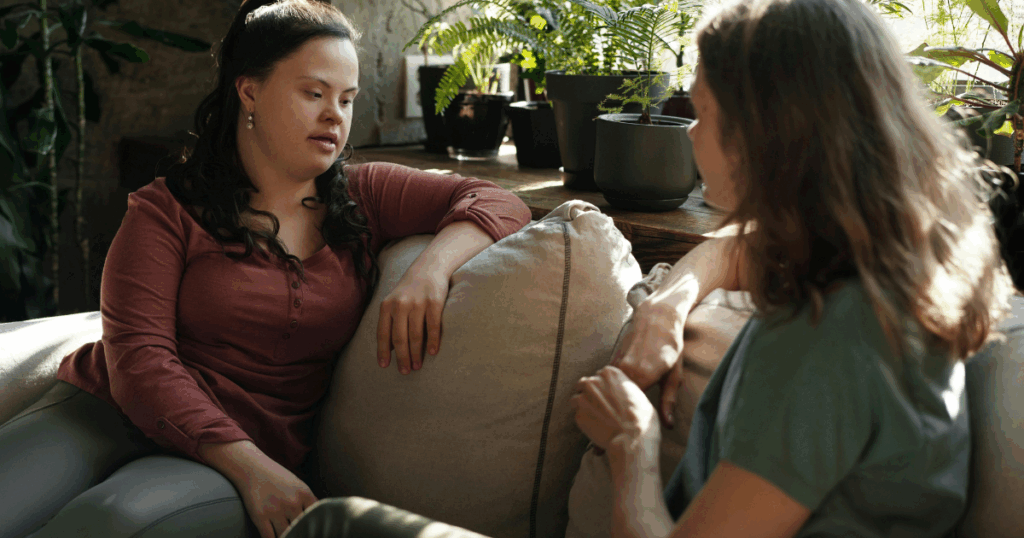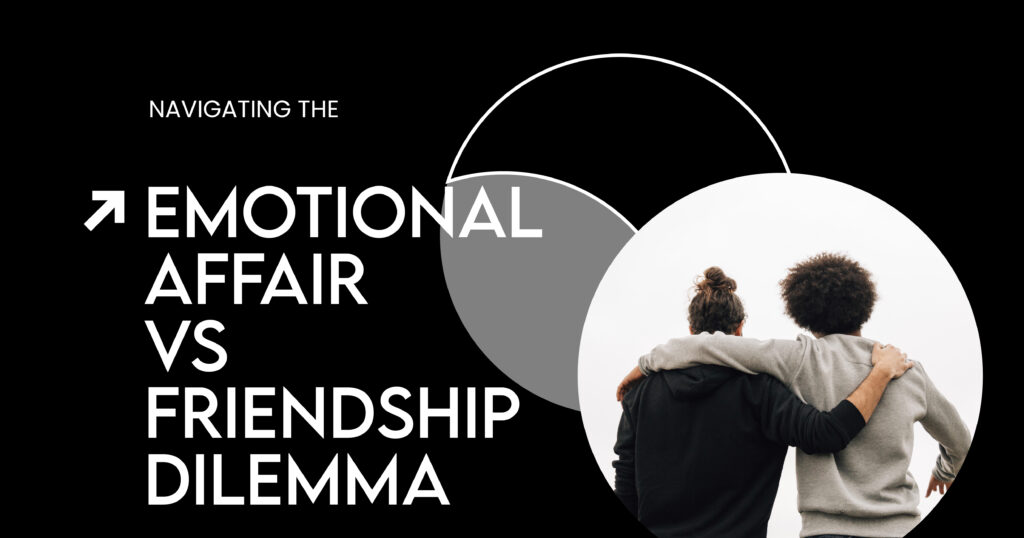Intimacy and trust in all relationships are based on emotional ties. But the border between good friends and an emotional affair is very thin, and couples are lost and offended. It is important to know where emotional attachment is translated into emotional betrayal to ensure that any relationship is healthy. It is not too much to question boundaries as it is about knowing how to emotionally care about each other, addressing communication problems, and the development of human relationships.
Emotional Intimacy and Its Role in Relationships
Emotional intimacy is the strong emotional connection that enables two individuals to feel that they are understood, appreciated, and encouraged. It is not just physical affection, but it is also about vulnerability, openness and trust. Having emotional intimacy makes the couple feel safe and connected and forms the basis of the relationship.
Nonetheless, emotional intimacy may move out of the relationship in case it is not cultivated. Being open and sharing personal struggles, secrets, or emotional comfort with someone other than your partner may unintentionally form a strong bond. That is where emotional infidelity may start, not with an actual proximity but with emotional reliance and confidentiality.
Nashville Mental Health
Understanding Emotional Intimacy
In order to familiarize themselves with emotional intimacy, one ought to understand what emotional intimacy entails. Empathy, communication and trust work towards the building of emotional closeness. It is not a one-night affair, but it is built over time through shared experiences and sincere communication.
Here’s a closer look at how emotional intimacy differs from other forms of connection:
| Type of Connection | Description | Common Indicators |
| Emotional Intimacy | Deep sharing of personal thoughts, feelings, and vulnerabilities | Mutual trust, emotional safety, and open communication |
| Physical Intimacy | Expression of affection through touch, closeness, or sexual connection | Physical closeness, comfort, and affection |
| Intellectual Intimacy | Sharing ideas, beliefs, and meaningful discussions | Stimulating conversations and shared intellectual interests |
| Recreational Intimacy | Bonding through shared activities or hobbies | Enjoyment in spending time together and similar interests |
Once aware of these differences, it will become easier to figure out whether your relationship has been crossed by an outside connection or not. A good friendship is open, while an emotional affair is based on secrecy or unfulfilled needs.
The Importance of Boundaries in Relationships
Emotional proximity is maintained by boundaries that prevent such intimacy from entering dangerous areas. Boundaries in relationships also come into play in relationships as agreements between the parties regarding what is acceptable and what is not. In their absence, emotional boundaries are likely to become blurred and trust is likely to be lost.

Healthy boundaries are not obstacles, they are the system that safeguards emotional intimacy. They allow room to be different and at the same time respect one another. The following are some of the examples of healthy boundaries that protect relationships:
- Do not talk with friends of the opposite sex about intimate relationship problems (and the same, in case it is possible).
- Maintain free and open communication with your friends and partners.
- Watch out regarding sharing emotional or romantic fantasies outside the relationship.
- Establish electronic limits to curtail personal or confidential texting, messaging, or late-night conversations.
- Regularly check in with your partner about comfort levels in friendships.
According to a 2023 article by Psychology Today, an emotionally dependent relationship can be reduced through healthy relationship boundaries and greater respect between the partners. When these limits are set, trust is improved and emotional security is reinforced.
Trust Issues and Their Impact on Emotional Connection
Emotional intimacy is established on the basis of trust. Without it that even the strongest emotional relationships can fall apart. Trust is destroyed – be it by lying, secrecy, or emotional unfaithfulness – and it creates lasting emotional harm.
The issue of trust is likely to cause trouble whenever the involved parties feel that the other is not involving them in their emotional world. This amounts to marginalization that creates insecurity, mistrust, and resentment. Restoring trust is a long process, it involves transparency, reassurance, and open communication on a regular basis.
At Nashville Mental Health, therapists have noticed that it is possible to reestablish trust once it has been broken, but they have to work together to do it. Both spouses will have to deal with unpleasant realities, and both are forced to find solace in each other.
Recognizing Emotional Infidelity
Emotional infidelity occurs when the emotional energy that was once given to a partner is redirected toward another person. It does not necessarily include physical touch, but it can be equally damaging. It flourishes in secrecy, emotional secrecy and gradual loss of intimacy in a partnership.
Common signs of emotional infidelity include:
- Conversing with another person without your partner’s knowledge.
- Having emotional proximity to another person.
- Comparing your partner unfavorably to another person.
- First look outside your relationship to find comfort, acceptance or counsel.
Friendships do not have such an emotional charge as emotional affairs do, which tend to be filled with unfulfilled romantic energy and secrecy. They may develop naturally and this begins with harmless talks, which develop into emotional addiction.
The Gottman Institute has presented a very informative article explaining that emotional affairs often result from unmet needs rather than premeditated betrayal. They can best be avoided by pouring your heart into your partner by engaging in meaningful conversations, sympathy and appreciation.
The Line Between Close Friendship and Emotional Dependency
It is natural that strong friendships are created outside a romantic relationship. But emotional dependency is dangerous when the friend turns into the major source of emotional anchor rather than the partner. The distinction is in transparency and will. Best friends are the foundation of your romantic relationship- they bring happiness, encouragement and companionship. On the contrary, emotional dependency takes the place of the emotional fulfillment that your partner should provide.
Once an emotional dependency sets in, partners can start to experience being replaced, unconnected or jealous. This imbalance results in strain and may culminate in a complete emotional affair unless remedied. Emotional honesty is needed to bring the balance. Self-merit: I am telling you this because I require someone to listen to me, or I require this person to confirm me more than my partner?
Relationship Dynamics and Their Influence on Emotional Intimacy
Each relationship possesses its own relationship dynamics, which is influenced by the style of communication, personality differences, and the need to be emotionally satisfied. In a healthy case, emotional intimacy is promoted when these dynamics are healthy. Emotional distance increases when they are unbalanced.
To bring up a good example, in case one of the partners feels neglected or not listened to, they will unconsciously find emotional solace elsewhere. With time, this external relationship may develop into a strong emotional attachment, which causes conflict and guilt.

Therapists normally suggest that couples develop emotional intimacy by:
- Involuntary empathy and active listening.
- Regular communication rituals such as check-ins or shared moments of gratitude.
- Being vulnerable with each other – meaning not being afraid to share emotions openly.
By focusing on these habits, partners can restore connection and prevent emotional affairs from forming.
Nashville Mental Health
Fostering Healthy Emotional Connections at Nashville Mental Health
At Nashville Mental Health, we believe that understanding emotions is the first step toward healthier, more fulfilling relationships. Our therapists provide evidence-based therapy for couples navigating emotional intimacy, trust issues, and boundaries in relationships.
We provide a safe, understanding environment to deal with the role your emotional needs are playing on your relationship. Regardless of whether it is emotional infidelity or you just want to make your emotional relationship stronger, our mission is to get you back to trust and intimacy.
If you cannot distinguish between an emotional affair and a friendship, contact us. We will help you to know the signs, redefine boundaries, and develop the type of emotional security every relationship should have. Call Nashville Mental Health now and book a private appointment and prepare to be emotionally clear and heal the relationships.
FAQs
What is emotional intimacy, and how does it affect relationship dynamics?
Emotional intimacy entails the aspect of openness, empathy and mutual vulnerability. It affects the workings of relationships profoundly, as it enhances trust and communication between couples.
How can boundaries in relationships prevent emotional dependency and strengthen emotional connections?
Healthy boundaries in relationships help partners maintain individuality while preserving trust, reducing the risk of emotional dependency and enhancing overall emotional safety.
What are the signs of emotional infidelity, and how can it impact trust issues in a partnership?
Some of the characteristics of emotional infidelity involve secrecy, constant emotional exchange with a third party, and emotional distancing. It is capable of grossly affecting trust and emotional safety in a relationship.
How can one differentiate between a close friendship and an emotional dependency that may harm a relationship?
A close friendship supports your relationship, while emotional dependency replaces it. Transparency and balance are key – if secrecy or guilt exists, it may signal dependency.
Nashville Mental Health
What role do trust issues play in shaping the emotional connection between partners?
The problem of trust leaves a gap of emotions and insecurity and cannot support healthy emotional relationships. It takes openness, steadfastness, and compassion to restore trust.





